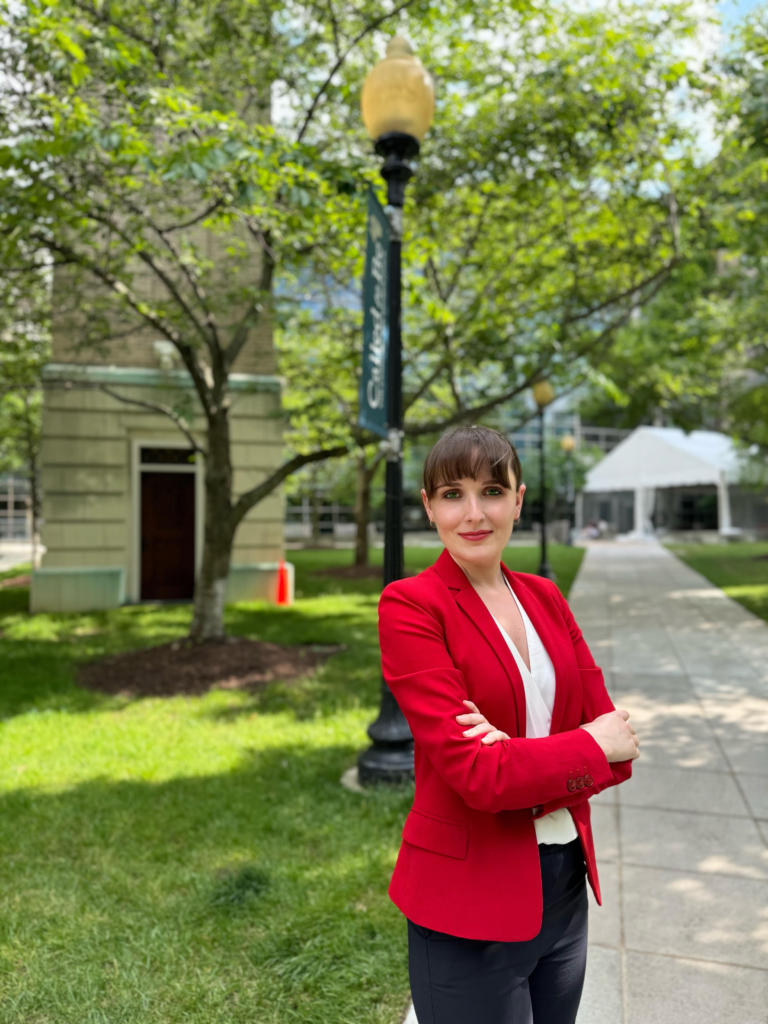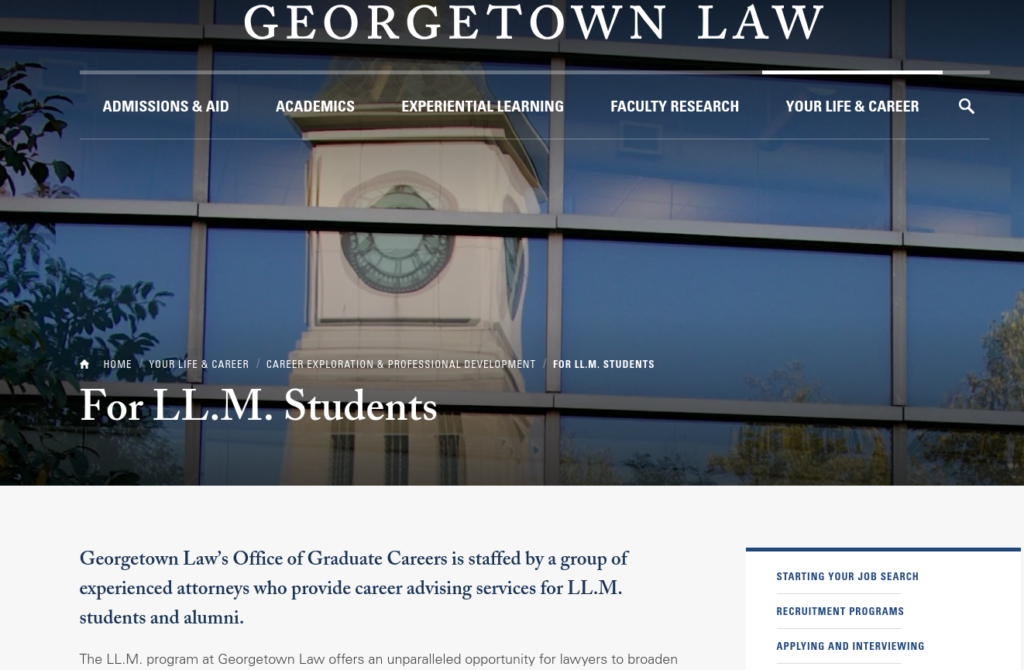
Post by Salome Adeishvili, who just completed her first year of Georgetown Law’s Two-Year LLM and will graduate in Spring 2025. Salome is from a small town called Samtredia in Georgia. Fun fact from Salome: Samtredia translates as “three pigeons.” 🙂
In case you missed them, you can read Salome’s prior posts here.
August 2024
Dear Diary (and Future Readers),
Do you want to know how it all concluded? We have reached the satisfying moment when you can tuck this experience away on the imaginary shelves of your mind and the real lines of your resume. Let’s delve into the final facets of a summer externship that are worth reflecting on before you close this chapter.
In the first part of this blog, I will wrap up the discussion on the final steps of Georgetown University’s requirements and share my thoughts and experiences on crafting the Reflection Memo, as I promised in my second post. In the second part, I will discuss the value of externships for multilingual international lawyers. In the third part, I will discuss the strategies to develop professional growth and skills during an externship. In the conclusion, I will reflect on how transformative this externship has been for this new chapter of my academic and professional career.
- Crafting the Reflection Memo
In this part, I will be guiding you on how to effectively approach writing your Reflection Memo at the end of your externship. The Reflection Memo is a critical component of your externship experience, allowing you to thoughtfully analyze and document what you have learned, how you have grown, and how your experience aligns with your career goals. I will share three important strategies on how to stay engaged with these reflective topics throughout your placement to ensure that when the time comes to write your memo, you will have a wealth of insights ready to shape into a meaningful reflection.
First, to prepare for writing the Reflection Memo, it is essential to approach your externship with an active mindset, continuously engaging with the key topics the memo will cover. Throughout the externship, you should keep in mind the questions you need to answer, allowing you to reflect on your experiences throughout the externship.

Second, during the semester, your externship supervisor from Georgetown University will most likely point out specific topics and areas that can inform your memo. This guidance is invaluable, as it helps you know what to pay attention to and what reflections will be most relevant to your final write-up. As you work on cases or engage in various tasks, consider how these activities align with the organization’s mission and your initial expectations. Pay attention to surprising elements of the work environment or your responsibilities, as these will form a crucial part of your reflection. It is also beneficial to observe how your skills develop over time, noting specific tasks that contribute to your growth. Take note of any lessons or insights gained that go beyond classroom learning, as these will be valuable in your reflection on the most important takeaways from the externship.
Third, use the expected discourse conventions for the Reflection Memo. In the first year of my Two-Year LLM program, I took Fundamentals of Legal Writing I and II. These courses were crucial in teaching me how to write like a US legal professional, focusing on US writing styles tailored for legal readers. This approach was entirely new to me, as I had not previously encountered this style of legal writing in my career. I highly recommend paying close attention to these classes, as they will be invaluable not only for writing your Reflection Memo for the externship but also for crafting any academic papers during your second year.
In summary, writing a strong Reflection Memo requires ongoing engagement with your experiences, noting your evolving thoughts, and advanced writing skills, all while keeping in mind the specific guidance provided by your supervisor.
- Why is it valuable to do an externship/internship for multilingual international lawyers
In this part, I will cover two key benefits of an externship: gaining real-world experience in a different legal system and enhancing language skills in legal contexts.

- Real-World Experience in a Different Legal System
As a multilingual lawyer from a Civil Law country, engaging in an externship has been essential for me. It has given me the opportunity to gain firsthand experience in a Common Law system, which is quite different from what I am familiar with. This exposure has been crucial in helping me understand the nuances and complexities of practicing law in a jurisdiction other than my own. Before I can fully step into the role of an attorney and take on all the responsibilities that come with it, I needed to have this experience. It prepared me for the challenges of working in a Common Law system, ensuring that I am well-equipped to navigate this legal system with confidence.
- Enhanced Language Skills in Legal Contexts
Being multilingual is undoubtedly an asset, but using multiple languages in a professional legal setting takes those skills to a higher level. It helps refine your language abilities, especially those that rely on legal terminology and formal communication. In this context, it is not just about translating words but truly understanding the legal concepts behind them. Sometimes, literal translations of legal terms can lead to confusion, as the same word might mean something entirely different in another legal system. This is why asking questions and seeking explanations about legal terms is crucial. For a lawyer coming from a non-English-speaking country, this experience is invaluable. It helps you become proficient in the legal language of another country, setting you apart in the global legal market and ensuring that you can navigate complex legal discussions with confidence and clarity.
- Growth and Skills: Lessons Learned and Future Advice
This part of the blog will cover how I have grown in my professional skills and how these skills will benefit my future career and LLM studies.

- Growth as a Legal Professional
At the start of my externship, managing my time and handling complex immigration cases was tough. I felt overwhelmed and struggled to keep up with the fast pace. But as I practiced and adapted, I became more efficient and organized. The feedback from my supervisor attorney was incredibly helpful, turning my challenges into learning opportunities. My advice is not to get discouraged. Even if progress can feel slow, keep moving forward, practicing, and doing your best. Every small step counts, and, with persistence, you will eventually find yourself making significant strides toward success.
- Skills to Take into My Legal Career and LLM
The skills I have developed during this externship will be pivotal for my future career. I have gained a solid understanding of US Immigration Law, which aligns with my professional interests. As I progress into my second year and take courses on Immigration and Refugee Law, this practical experience will provide a significant advantage. Conversely, these courses will address any gaps in my theoretical knowledge. Together, this blend of hands-on and theoretical experiences will equip me to handle complex legal issues with confidence and professionalism.
For future students, my advice is to make the most of your externship by aligning it with the field you plan to study and work in. Choose a placement that complements your academic and career goals, and strive to gain as much practical experience as possible. Your externship is an opportunity to build a strong foundation for your future career, so embrace it fully and do your best.
- Conclusion
In wrapping up this journey, it is clear that an externship offers far more than just a glimpse into the professional world—it is a transformative experience that shapes both your legal skills and your career outlook. From mastering the art of reflection to navigating a new legal system and honing language skills, every challenge encountered is an opportunity for growth. As you prepare to take the next steps in your career and academic pursuits, remember that the insights and experiences gained during your externship will serve as a solid foundation for your future successes.
To speak of my experience, this journey, once daunting, now sits neatly on the shelf of my professional life, ready to support the next steps in my LLM studies and beyond. I got my second happy ending. But just as one chapter closes, another begins. Is there a prospect of a third happy ending to this story?
I received a job offer from my externship firm, which I happily accepted. There will be more to share about that in the future, in a different time and place, but for now, let’s savor this accomplishment and look forward to what comes next.










